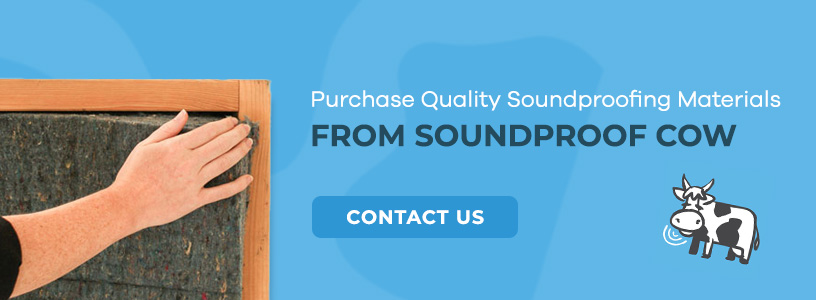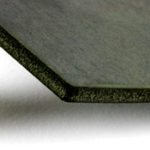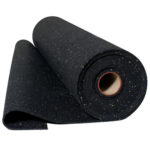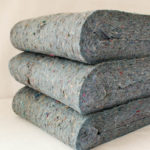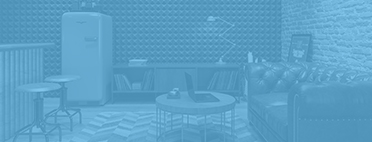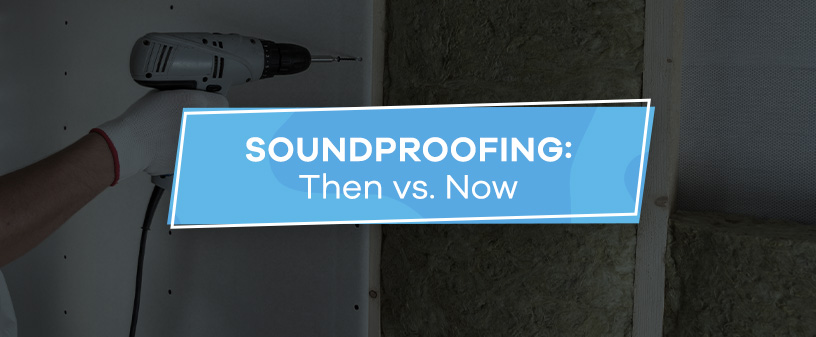
Did you know acoustic science dates back to the ancient Greeks? From amplification to dampening, people have been researching sound manipulation technologies for millennia.
This article will take you on a journey through soundproofing history. We will compare the previous gold-standard soundproofing materials to today’s most popular products so you can understand what is best for your needs.
Lead Sheeting vs. Mass Loaded Vinyl
History buffs — and fans of Christopher Nolan’s “Oppenheimer” — know the United States tested the first nuclear weapon on July 16, 1945, pushing the world into what historians call “the Nuclear Age.” During this time, especially during the Cold War, the government built lead-encased fallout shelters throughout the country to protect ordinary citizens from foreign attacks.
Lead is a dense material, which means it is more difficult for sound to pass through lead-lined surfaces. When people realized these shelters were soundproof, acoustic science changed forever. Lead sheet soundproofing gained a reputation for being the top noise control solution, a reputation that lasted for decades.
That is until we learned lead is bad for you. Clearly, we needed a safer alternative.
The Rise of Mass Loaded Vinyl for Soundproofing
Mass-loaded vinyl (MLV) is made from a mixture of sand, salts and metals. It has similar soundproofing qualities to lead but is a safer material for your health.
Some of the advantages of using MLV instead of lead sheeting for soundproofing include:
- Easier to install and maintain: MLV is safer to handle than lead. It also weighs less, making it easier to attach to studs and joists in the area you want to soundproof.
- More environmentally friendly: MLV is nontoxic and recyclable, making it a greener choice than lead. For example, we make our Quiet Barrier® MLV products with 15% recycled materials.
- More cost-effective: Even if you hire a professional to install your MLV for you, you will pay significantly less than you would have if you purchased lead sheet soundproofing.
Due to its ease of use and affordability, MLV is a popular soundproofing material for:
- DIY home soundproofing.
- Pipe noise reduction.
- Office soundproofing.
- Professional music studios.
- Public transportation.
Shop Mass Loaded Vinyl Barriers
Cork vs. Rubber Underlayment
When you need to prevent sound from traveling between building stories, a floor underlayment is the solution. Two of the most prominent underlayment materials available today include acoustic cork and rubber, which is a newer option.
Cork has a reputation for being one of the most environmentally friendly materials you can use, and it is incredibly versatile. In addition to soundproofing underlayments, you can find cork in these items:
- Clothing
- Wine bottles
- Kitchen accessories
- Home decor
Cork can be expensive. You need significantly more of it to block sound than you need with other materials — Could there be another option?
Is Rubber a Better Alternative?
The simple answer — yes!
Rubber is a superior material for soundproofing floors, and it can be just as environmentally friendly. Our Impact Barrier QT Flooring Underlayment is made from 92% recycled rubber, making it a sustainable and higher-performing alternative to cork.
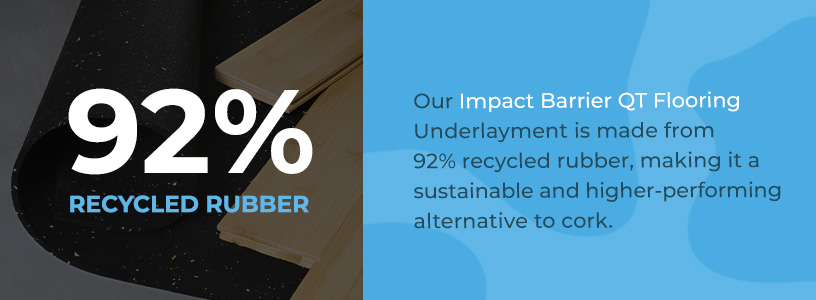
Manufacturers often increase rubber’s elasticity by adding materials like graphite, which helps improve its noise reduction abilities and enables it to more effectively disperse impact noise throughout the floor.
Rubber reduces sound in two ways:
- Decoupling: By separating each side of the floor, the rubber underlayment enables both sides to vibrate independently of each other. This prevents noise from transferring to other floors.
- Dampening: Rubber’s elastic properties make it an effective shock absorber for areas such as schools, hospitals, gyms and fitness centers, retail stores and more.
Here are a few of the advantages you can gain from choosing rubber vs. cork underlayment:
- Resilience: Cork is soft and easy to damage. Rubber is flexible and can withstand long hours of heavy foot traffic.
- Sound absorption capacity: Rubber is higher density than cork, which enables even a thin layer to dampen impact sound better than the same amount of cork.
- Moisture resistance: Unlike cork, rubber is waterproof. It can protect your floors from moisture-related issues like mold and mildew growth.
- Cost-effectiveness: Because rubber has a higher density, you can use less of it to get the same results — which will significantly cut your purchase and installation costs.
Mineral Wool vs. Cotton Insulation
So, what is mineral wool?
Mineral wool insulation is similar to fiberglass insulation but with a few key differences. Mineral wool can contain a phenol-formaldehyde binder that holds the material together and locks out moisture.
Unlike fiberglass, mineral wool is made from natural raw materials like basalt rock or slag, which is a byproduct of iron ore smelting. It can have a higher density, making it an effective sound blocker.
Cotton Insulation: A Green Alternative
Often made from recycled textile scraps, cotton soundproofing insulation is a green alternative. For instance, we produce our Quiet Batt® insulation solutions with 80% recycled fibers, making them a sustainable option for eco-conscious buildings.
Cotton batting is also formaldehyde-free, so you can safely install it without needing to wear gloves or other personal protective equipment.
Some advantages of cotton batting include:
- Superior sound absorption: Cotton is unique in that it can effectively absorb sounds with high frequencies.
- Soundproofing: Although cotton is incredibly lightweight, its fibers are dense and multidimensional. This property adds mass to your walls and enables the material to block sounds coming from different angles.
- Heat isolation: Cotton’s multidimensional fibers make it effective at trapping sound waves and holding them as heat.
Purchase Quality Soundproofing Materials From Soundproof Cow
We have mooooved on from the days of lead sheeting for soundproofing. But without those early years, how long would it have realistically taken to create safe, effective products like mass-loaded vinyl and cotton insulation?
Soundproof Cow values our history — and we use our knowledge to develop the best possible solutions. Whether you need door seals or sweeps to soundproof your laundry room or custom sound-absorbing acoustic panels for your studio, we can help you find products that meet your needs.
Want to learn more about our products? Call our office at 866-949-9269 or submit our contact form to talk to one of our experts!


